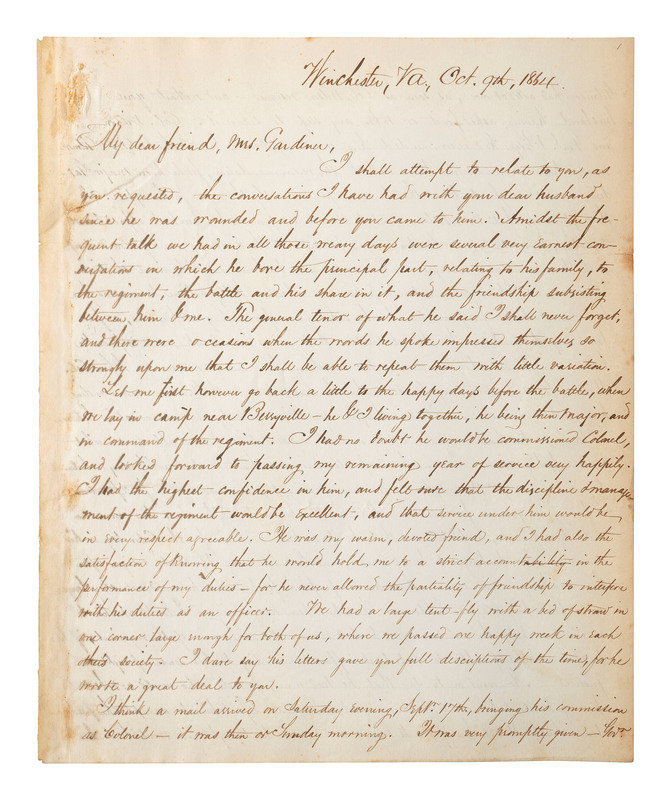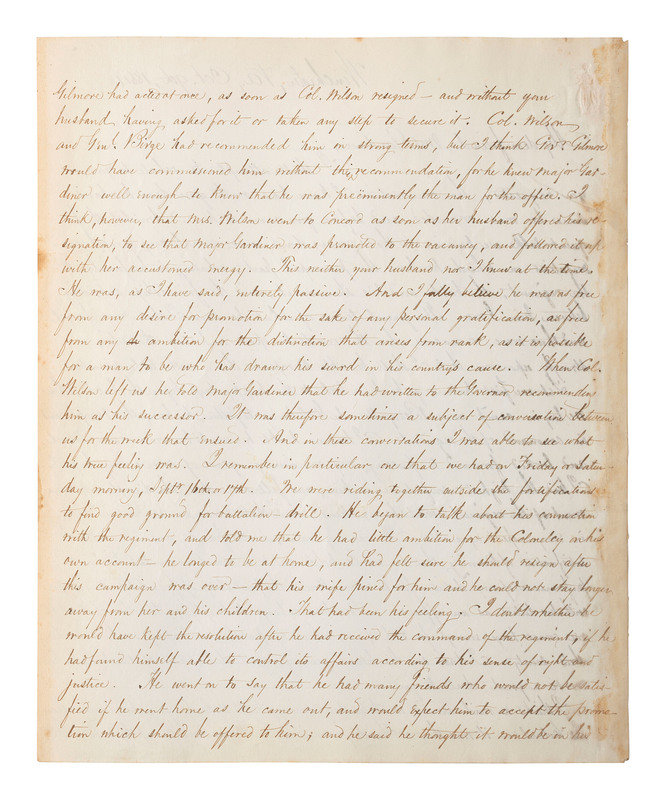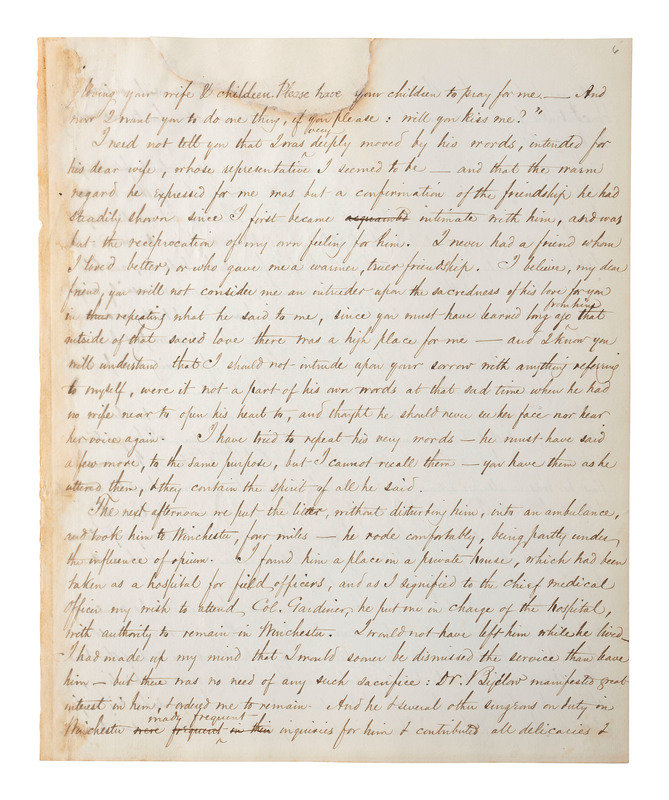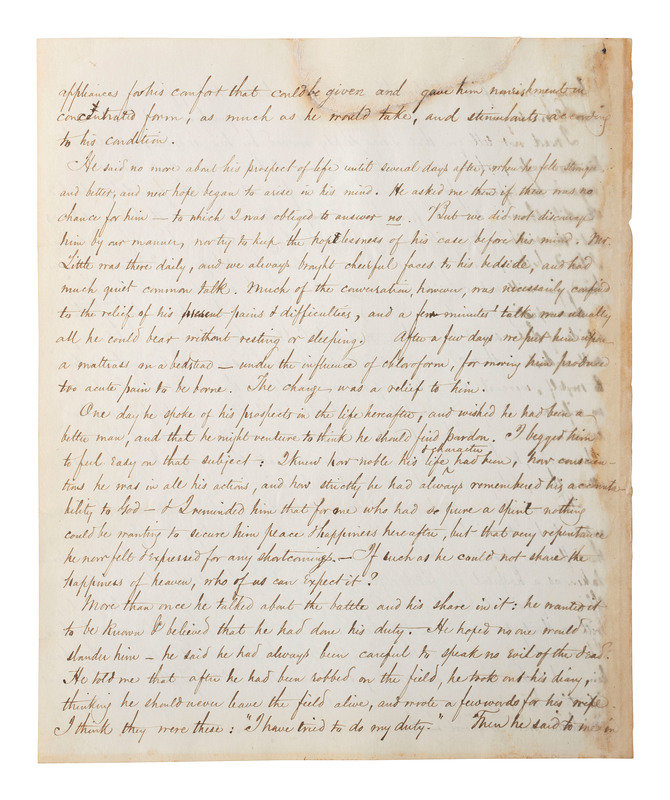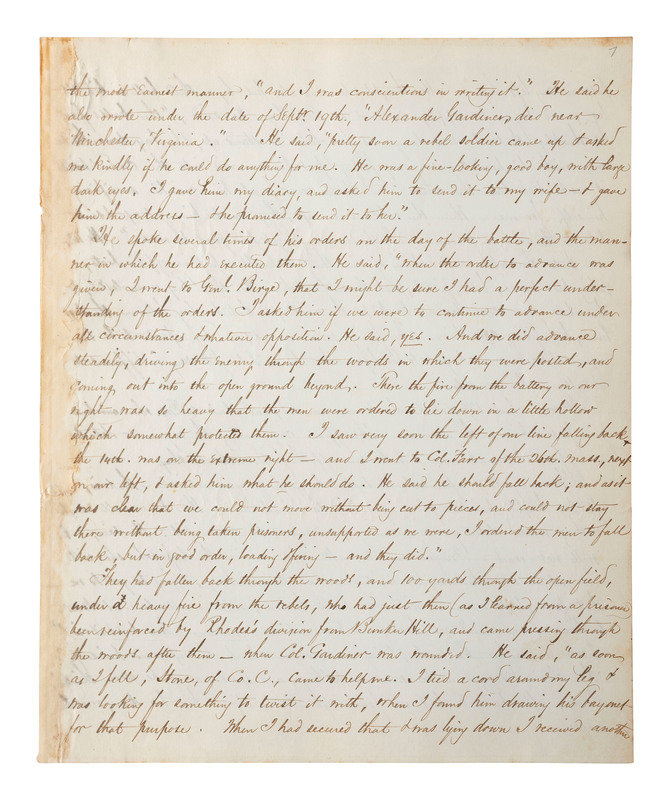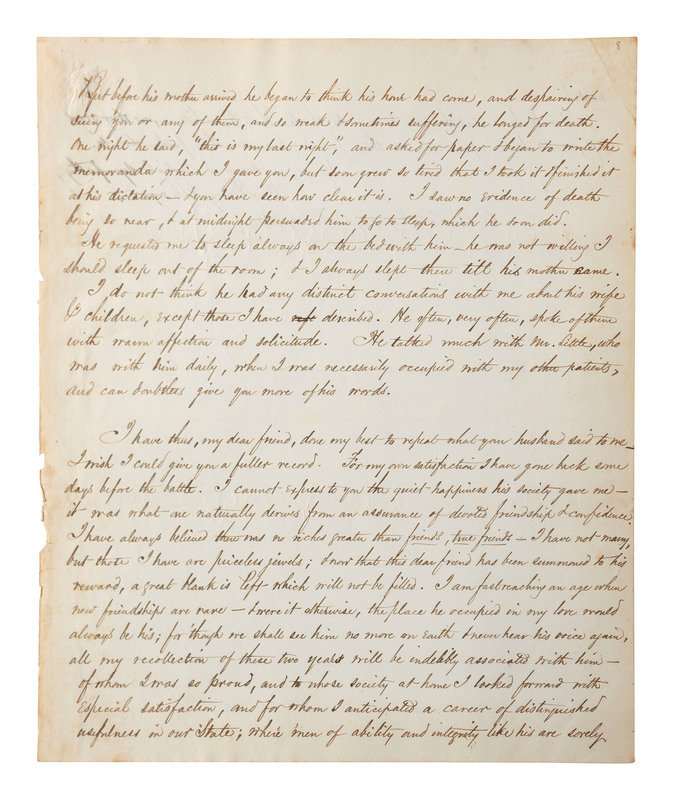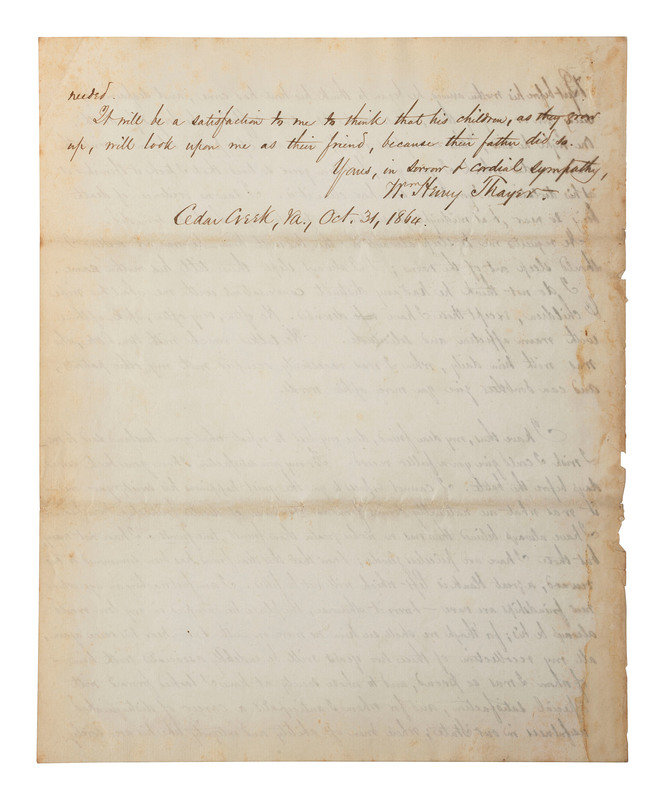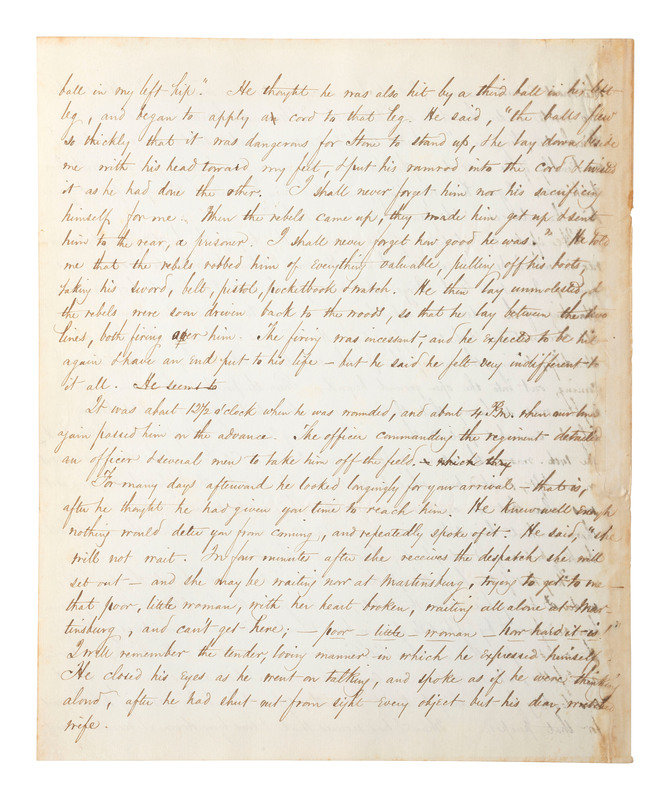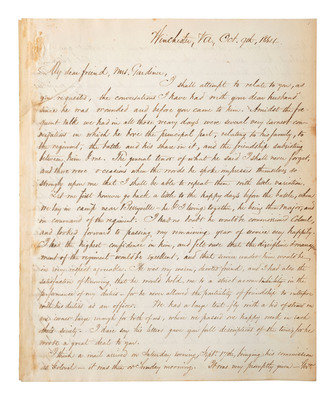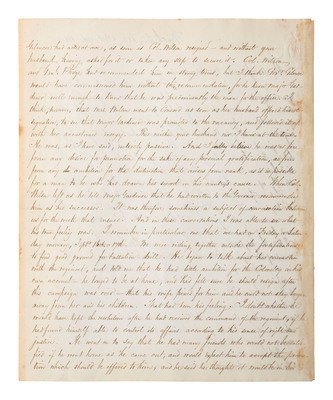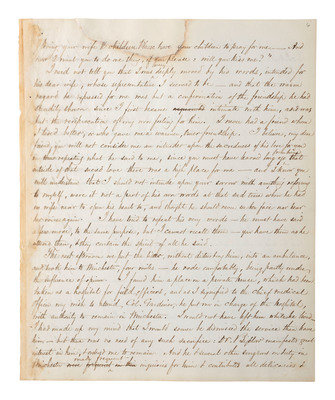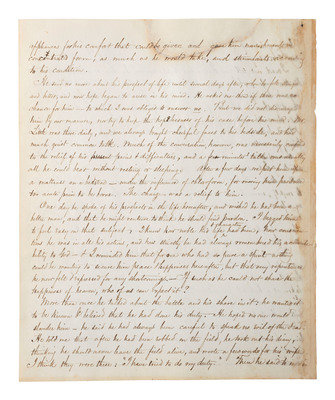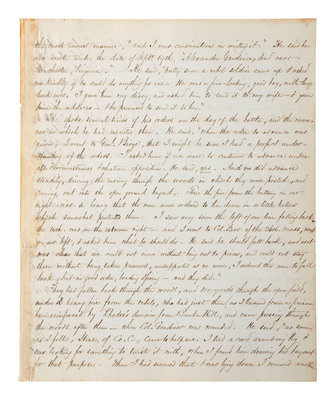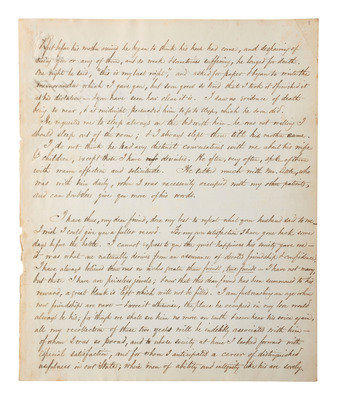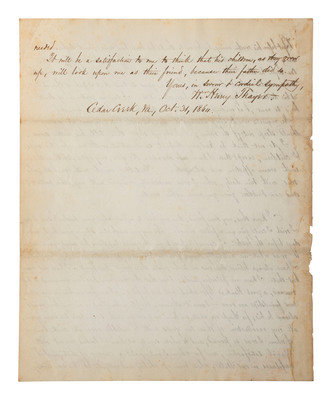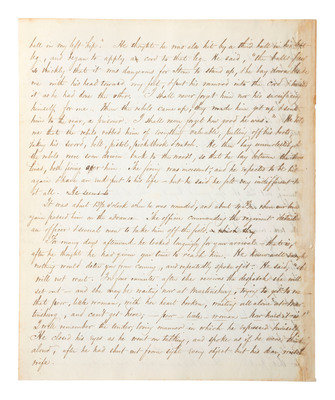Lot 113
[CIVIL WAR]. THAYER, William Henry. Autograph letter signed ("Wm. Henry Thayer") as regimental surgeon, 14th New Hampshire Infantry, describing the wounding, treatment, and death of his fellow soldier Colonel Alexander Gardiner who was mortally injured at the Battle of Opequan. Winchester, VA, 9 October 1864.
Sale 1095 - American Historical Ephemera & Photography, Featuring Property from the James Milgram, M.D., Collection of Broadsides, Ephemeral Americana & Historical Documents
Day 1 Lots 1-403
Nov 3, 2022
10:00AM ET
Day 2 Lots 404-634
Nov 4, 2022
10:00AM ET
Live / Cincinnati
Own a similar item?
Estimate
$1,000 -
2,000
Price Realized
$1,500
Sold prices are inclusive of Buyer’s Premium
Lot Description
[CIVIL WAR]. THAYER, William Henry. Autograph letter signed ("Wm. Henry Thayer") as regimental surgeon, 14th New Hampshire Infantry, describing the wounding, treatment, and death of his fellow soldier Colonel Alexander Gardiner who was mortally injured at the Battle of Opequan. Winchester, VA, 9 October 1864.
16 pages, 8 x 9 3/4 in., soiling/discoloration, some pages with an unidentified residue, perhaps from adhesive, along the edges.
Addressed to "My dear friend, Mrs. Gardiner," Thayer writes at length to the widow of Col. Alexander Gardiner (1833-1864) about the death of his "warm, devoted" friend. Thayer initially describes events from the days leading up to the battle in which Gardiner was killed, relaying Gardiner's promotion to colonel which "gave almost universal satisfaction," extolling the colonel's dedication and competency, and detailing preparations on the day of the Battle of Opequan, September 19.
Thayer then recounts a conversation he had with Gardiner several days after the battle in which Gardiner described the first advance of the line which came under withering fire as soon as the regiment entered upon the open ground. "He [Gardiner] said, 'We were ordered to dress on the 26th Mass/tts., which was on our left. As we neared the woods, the fire was awful; the air seemed full of shell and shot - I did not see how any one could come out of it alive - bullets came in a perfect storm. Sometimes one of the boys would turn from withering fire and look back, his face white as a sheet, and looking perfectly appalled - but when I gave the order 'steady - guide left' he would front face and march on, and the line continued unbroken." Later pages provide supplemental battle description including Gardiner's account of being shot during the battle and being robbed of everything of value while laying injured on the battlefield prior to the Confederate retreat.
The remainder of the letter describes the painful injuries sustained by Gardiner, the care tendered to Gardiner while dying, Dr. Thayer's examination and consideration of the colonel's multiple wounds, and the moment when Thayer confirmed for Gardiner that his wounds were fatal. Thayer writes in part: "An examination of his injuries satisfied me that they were mortal - and no surgical operation to relieve him or increase his chance of life was possible. His left thigh was broken a short distance below the hip joint, and the ball had apparently passed down towards the knee, doing considerable injury, and was still in the limb. This wound, had it been the only one, was almost certainly fatal, according to all surgical experience; and the chance of life would not have been increased by amputation, which would necessarily have been at the hip joint - an operation almost universally given up in such cases, as almost invariably fatal." Gardiner died 7 October 1864, just over two weeks after the Battle of Opequan.
William Henry Thayer (1822-1897) of Keene, New Hampshire, was a 40 year-old physician when he enlisted and was commissioned into the Field & Staff of the NH 14th Infantry. Though its initial service consisted primarily of picket and guard duty, from August to September of 1864 the regiment was part of General Sheridan's Army of the Shenandoah participating in significant engagements at the Battles of Opequan, Fisher's Hill, and Cedar Creek. The 14th NH Infantry suffered heavy losses at the September 19, 1864, Battle of Opequan (Third Battle of Winchester), losing one third of its number during a valiant thirty minute charge.
Condition Report
Contact Information
Auction Specialist
